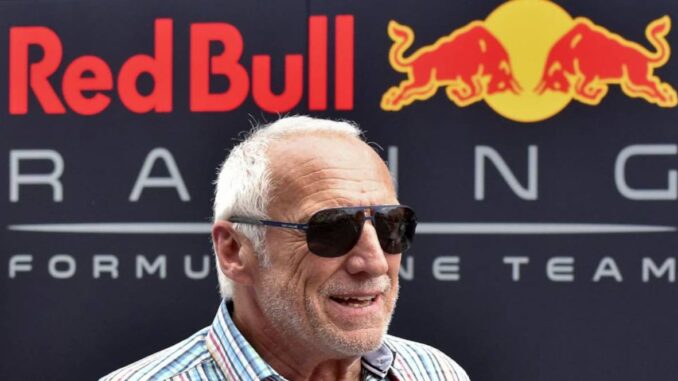
In a shocking turn of events, Red Bull GmbH, the powerhouse behind the global energy drink phenomenon and a dominant force in Formula 1 racing, has found itself at the center of a corporate maelstrom. The company’s CEO, Christian Horner, has been dismissed from his position following a series of allegations and internal investigations that have sent ripples through the motorsport community and the business world alike.
Christian Horner, a stalwart in the Formula 1 paddock, has been synonymous with Red Bull Racing’s meteoric rise since its inception in 2005. Under his leadership, the team clinched multiple Constructors’ and Drivers’ Championships, establishing itself as a formidable competitor against legacy teams like Ferrari and McLaren. Horner’s strategic acumen and unyielding drive were instrumental in nurturing talents such as Sebastian Vettel and Max Verstappen, propelling them to championship glory.
However, the veneer of success began to crack earlier this year when allegations surfaced accusing Horner of inappropriate and controlling behavior towards a female subordinate within the team. The gravity of these accusations prompted Red Bull GmbH to commission an independent investigation led by a King’s Counsel (KC) to ensure impartiality and uphold the company’s commitment to maintaining a respectful workplace environment.
The investigation, which commenced in February, was a focal point of media scrutiny. Horner, steadfast in his denial of any misconduct, continued to fulfill his duties amidst the probe. During the launch of Red Bull’s 2024 F1 car, he addressed the situation, stating, “I’m going through a process and fully respect it. For me, it is business as normal, and I’m focused on the season ahead.”
By late February, the investigation concluded with the KC dismissing the allegations against Horner. Red Bull GmbH released a statement expressing confidence in the fairness and rigor of the process, emphasizing their dedication to upholding the highest workplace standards. Despite the official clearance, the situation took an unexpected turn when alleged evidence, including texts and photos purportedly exchanged between Horner and his accuser, was leaked to prominent figures in the F1 community and the media. This development reignited debates and cast a shadow over the initial findings.
The internal dynamics within Red Bull Racing further complicated the scenario. Jos Verstappen, father of reigning world champion Max Verstappen, publicly criticized the team’s handling of the situation, suggesting that Horner’s continued leadership could lead to internal discord. He vehemently denied any involvement in the leaks but underscored the potential ramifications on team cohesion and performance.
In March, the female employee who had lodged the initial complaint against Horner was suspended on full pay, a move that attracted significant attention and raised questions about the company’s internal processes. Subsequently, she appealed the decision to clear Horner, but by August, this appeal was dismissed, with Red Bull GmbH stating that all stages of the appeal process had been concluded and that they would not comment further out of respect for all involved.
Behind the scenes, tensions escalated between Horner and Red Bull’s upper echelons. Reports indicate that Oliver Mintzlaff, CEO of Red Bull GmbH, had prepared to terminate Horner’s contract in early February, drafting a press release announcing his immediate departure. However, Horner, unwilling to accept this decision, threatened legal action, insisting on arbitration and challenging the grounds of his potential dismissal. Mintzlaff, convinced of Horner’s culpability based on the evidence at hand, reluctantly agreed to the arbitration process, anticipating a resolution that would uphold the company’s integrity.
The protracted nature of the investigation and the subsequent appeal process took a toll on Red Bull Racing’s internal morale and public image. Speculations about potential sponsorship losses and strained relationships with key partners, including automotive giant Ford, loomed large. The uncertainty surrounding Horner’s position also fueled rumors about Max Verstappen’s future with the team, with whispers of possible negotiations with rival teams gaining momentum.
Ultimately, the culmination of these events led to Red Bull GmbH’s decision to part ways with Christian Horner. In a statement, the company reiterated its commitment to maintaining a respectful and inclusive workplace, acknowledging Horner’s contributions over the years but emphasizing the necessity of this decision to uphold the organization’s core values.
Horner’s departure marks the end of an era for Red Bull Racing. His leadership was pivotal in transforming the team from a newcomer to a dominant force in Formula 1. As the organization embarks on the search for a new team principal, it faces the dual challenge of maintaining its competitive edge on the track while rebuilding trust and stability within its ranks.
The ripple effects of this leadership upheaval extend beyond Red Bull Racing. The Formula 1 community is abuzz with discussions about potential successors, the impact on driver dynamics, and the broader implications for the sport’s governance and corporate ethics. Sponsors, partners, and fans alike are keenly observing how Red Bull navigates this transitional phase, with hopes that the team’s legacy of innovation and excellence continues unabated.
In the high-octane world of Formula 1, where precision and performance are paramount, Red Bull Racing’s ability to steer through this storm will be a testament to its resilience and organizational fortitude. The coming months will be crucial in determining whether the team can maintain its trajectory of success or if this internal crisis will leave an indelible mark on its legacy.

Be the first to comment